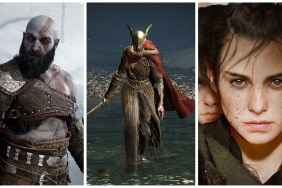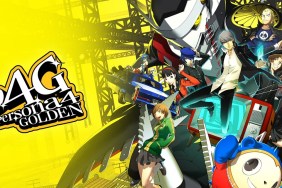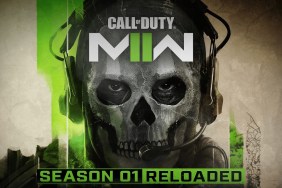Let me kill you! It’s the only way to save your soul!
The Kingdom of Gomar lies in ruins. In an effort to bring the dead Prince Sedan
back to life, Queen Antea and her son Felies have turned to the power of darkness
for aid. The King, hearing of this madness, banished his wife and surviving son
from Gomar, but it was too late. Using her newfound dark powers, the queen is
able to transform herself into mist that turns men into beasts. Her son took the
more direct approach, transforming himself into a dragon and attacking villages.
Only three heroes are unaffected by these dark forces: the wizard Orion, the spy
Sayomi, and the warrior Atlus. Together, these three must free the land of Gomar
from the curse that has fallen upon it.
Now if only there was some way to free the people without killing them…
One of my favorite games of all time has to be Golden Axe. There were
no puzzles, a linear storyline, and simple gameplay, but it was a blast to play.
Soul Fighter is attempting to recapture that former glory for all Dreamcast
owners to enjoy. Unfortunately, without multiplayer support, Soul Fighter
just can’t hope to be anything more than a minor diversion.
In a nutshell, the object of Soul Fighter is kill or be killed. On each
level, you must rid the land of all the baddies before you can progress. Considering
that there are 6 different pretty big levels, this task will take you a while.
Each time you kill an enemy, you collect their soul in a jar. Once the jar is
full, you face the boss of the level. Fairly basic, straightforward gameplay.
The sheer variety of monsters that you have to fight is impressive. There
are over 40 different bad guys to encounter, plus 5 different bosses. That’s
over 6 different character types per level, and they’re not just different colored
versions of the same guys. There are pigmen, jackelmen, fishmen, birdmen . .
. heck, the list goes on and on. That’s some powerful evil mist.
While the number of enemies is neat, their motion-captured movements are even
more amazing. The 3 main characters have over 100 different motion-captured sequences,
giving them smoother moves than John Travolta in Saturday Night Fever.
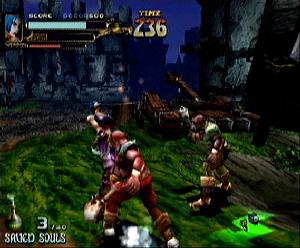 Good
Good
character movement is a great bonus, as long as the game itself is fun to play.
Unfortunately, Soul Fighter fails to capture the essence of what made
Golden Axe such a great game for several reasons.
First off, there is no multiplayer. Yes, it’s a mindless action beat-em-up
game, and yet you can only play it by yourself. Without a detailed story, the
game just boils down to repeatedly pummeling animal creatures. While that’s
fine and dandy for about 15 minutes, it just gets boring after that.
Second, the levels are badly made. Because the point of the game is to kill
everything (and I do mean EVERYTHING), sometimes you have to search an entire
level looking for that one last vulture-man that you missed. The first level,
for example, is setup in a circle, forcing you to backtrack over the places you’ve
already been. That just gets tedious.
Speaking of which, once you beat the game (which doesn’t really take that long
compared to most games these days) you’ll find yourself with little reason to
go back to it. I have composed a haiku to describe this feeling: You’ve played
it all once, there is nothing new to find, watch it gather dust.
There are two modes of play: Arcade and Adventure, but who cares? Arcade mode
doesn’t allow you to save, but gives you five continues and allows you to switch
heroes in-between levels. Adventure mode does allow you to save after every level,
but you can’t change characters and if you die, the game’s over. Neither mode
offers much depth, and you play the exact same levels with the same enemies in
the same order; so there’s really no difference which mode you choose.
Basically, Soul Fighter is an example of a throw-away game: take it
or leave it. While the game itself isn’t bad (and is actually worth a rental),
it isn’t that good either. The simplistic gameplay and the lack of a multiplayer
mode means used copies of Soul Fighter will quickly find themselves available
on the used video game market. Graphics don’t make a game great . . . I wish more
game designers would realize that.
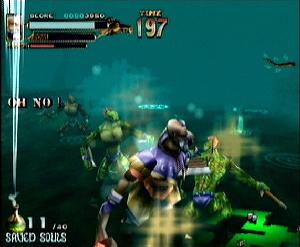
-
Great Graphics
-
Smooth Motion Capture
-
Large Number of Enemies
-
Repetitive Gameplay
-
Bad Level Design
-
NO MULTIPLAYER!









